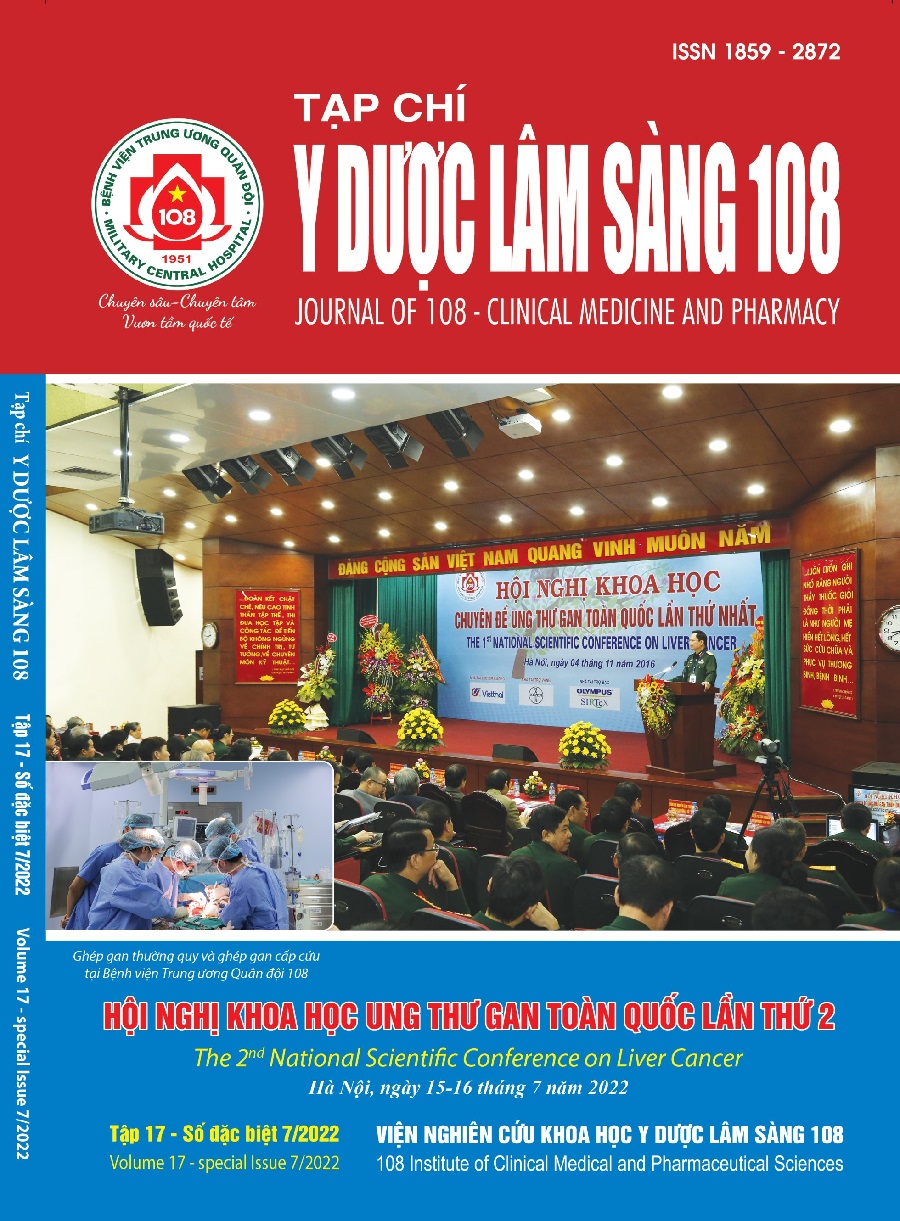Long term survival of radio frequency with Cool-tip electrode for hepatocellular carcinoma
Main Article Content
Keywords
Abstract
Objective: To evaluate long term survival and predictive factors of percutaneous radiofrequency ablation with Cool-tip for the treatment of hepatocellular carcinoma (HCC). Subject and method: A prospective study involved 82 cirrhotic HCC patients (mean tumor size: 3.15 ± 1.07cm) underwent percutaneous RFA using Cool-tip RF electrode (COOL-TIP E SERRIES, COVIDIEN) at the 108 Military Central Hospital, from September 2012 to July 2020). The Kaplan-Meier curves and the multivariate Cox regression analysis were used to assess long term survival and the prognostic factors. Result: The 3-year, 4-year, 5-year, 6-year, 7-year cumulative survival rate were 90.2%, 84.1%, 37.8%, 34.1% and 18.3% respectively. Tumour free survival 3-year, 4-year, 5-year, 6-year were 64.6%, 35.3%, 8.5% and 2.4% respectively. At multivariate analysis, independent prognostic factors for survival rate were tumour size, number of tumour, Child-Pugh classification, meanwhile number of tumour and AFP response were the predictive factors for progression free survival. Conclusion: RFA with Cool-tip electrode is effective and result in long term survirval, especially for patients with a single tumor, tumour size < 3cm, and well-preserved liver function.
Article Details
References
2. Nguyễn Tiến Thịnh (2011) So sánh hiệu quả điều trị ung thư biểu mô tế bào gan bằng phương pháp tắc mạc hóa dầu đơn thuần và tắc mạch hóa dầu kết hợp đốt nhiệt sóng cao tần. Luận án Tiến sỹ y học, Viện NCKH Y Dược lâm sàng 108.
3. GLOBOCAN (2018) Cancer fact sheet: Liver cancer incidence and mortality wordwide in 2018. Online publish.
4. Gisele N’Kontchou et al (2009 Radiofrequency Ablation of hepatocellular carcinoma: Long-term results and prognostic factors in 235 western patients with cirrhosis. Hepatology 50(5).
5. Peng ZW, Lin XJ et al (2012) Radiofrequency ablation versus hepatic resection for the treatment of hepatocellular carcinomas 2cm or smaller: A retrospective comparative study. Radiology 262(3): 1022-1033.
6. Olivier Seror et al (2008) Large (≥5.0cm) HCCs: Multipolar RF ablation with three internally cooled bipolar electrodes initial experience in 26 patients. Radiology 248(1): 288-296. doi: 10.1148/radiol. 2481071101.
7. Kim YS, Lim HK et al (2013) Ten-year outcomes of percutaneous radiofrequency ablation as first-line therapy of early hepatocellular carcinoma: Analysis of prognostic factors. Journal of Hepatology 58(1): 89-97.
8. Kudo M (2010) Radiofrequency ablation for hepatocellular carcinoma: Updated review in 2010. Oncology 78(1): 113-124.
9. Lee DH, Lee JM et al (2013) Radiofrequency ablation of hepatocellular carcinoma as first line treatment: Long term results and prognostic factors in 162 patients with cirrhosis. Vascular and Intervention Radiology 270(3): 900-909.
10. Ng KKC et al (2017) Randomized clinical trial of hepatic resection versus radiofrequency ablation for early-stage hepatocellular carcinoma. The British journal of surgery 104(13): 1775-1784.
11. Shiina S, Tateishi R et al (2012) Radiofrequency ablation for hepatocellular carcinoma: 10-year outcome and prognostic factors. Am J Gastroenterol 107(4): 569-577; 578.
12. Mukund A et al (2020) Early hepatocellular carcinoma treated by radiofrequency ablation-mid- and long-term outcomes. Journal of clinical and experimental hepatology 10(6): 563-573.
13. Zhang W et al (2017) Long-term survival of hepatocellular carcinoma after percutaneous radiofrequency ablation guided by ultrasound. World journal of surgical oncology 15(1): 122.
14. Xu Q et al (2014) Comparison of hepatic resection and radiofrequency ablation for small hepatocellular carcinoma: A meta-analysis of 16,103 patients. Scientific reports 4: 7252.
15. Forner A et al (2018) Hepatocellular carcinoma. Lancet (London, England) 391(10127): 1301-1314.
 ISSN: 1859 - 2872
ISSN: 1859 - 2872
